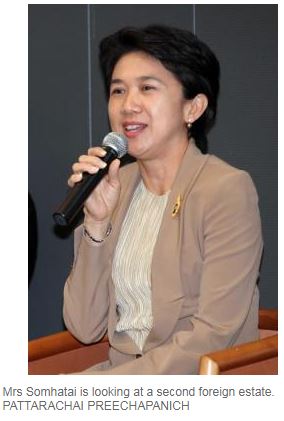Amata eyes Yangon for next foreign play
Amata VN Plc, a subsidiary of SET-listed industrial estate developer Amata Corporation, plans to develop a 50-square- kilometre plot in Yangon as its second foreign industrial estate in 2019.
Amata VN is conducting a feasibility study to allocate budget for the first phase of the industrial estate in Myanmar’s biggest city. In this phase, the company plans to build all related infrastructure to prepare for future investors.
Somhatai Panichewa, president and chief executive, said Amata VN will develop the project in the first half of 2019, dependent on Myanmar’s political environment.
“The plot is located in northern Yangon,” Mrs Somhatai said. “This project will be 10 times larger than the [nearby] Thilawa special economic zone.”
She said the first phase is focused on sectors that industry is trying to make greener, such as electronics, garments and textiles, which require a great deal of manpower.
Amata VN also aims to develop an industrial estate near Vientiane, focused on Chinese investors and Amata customers from Thailand seeking to expand in Laos.
Laos would be the third foreign industrial estate under Amata VN’s operation.
“We will start to acquire the land plot and allocate the budget for the industrial estate’s infrastructure in 2019,” Mrs Somhatai said. “Both projects in Myanmar and Laos will use business models similar those in Thailand to develop the industrial estate as an eco-friendly concept.”
For Amata’s first foreign industrial estate in Vietnam, the company will increase spending in 2019 for all three locations: Amata City Bien Hoa, Amata City Halong and Amata City Long Thanh.
In 2018, Amata VN budgeted 3.4 billion baht for development of infrastructure at the three locations.
“We aim to complete our investment in all neighbouring countries of Thailand because those countries are developing countries with new foreign investment flows, so they are high-potential locations for Amata’s investment,” Mrs Somhatai said.
In addition, the Vietnamese government has developed a large seaport in Da Nang to serve transport flows connecting to the South China Sea, she said.
The major investors at all three locations in Vietnam are Japanese companies, and they are also clients at Amata locations in Thailand.
Amata VN expects 2018 revenue growth of 5-10% from 1.17 billion baht in 2017, all from Vietnamese operations.
Source: https://www.bangkokpost.com/business/news/1604546/amata-eyes-yangon-for-next-foreign-play


 Thailand
Thailand




